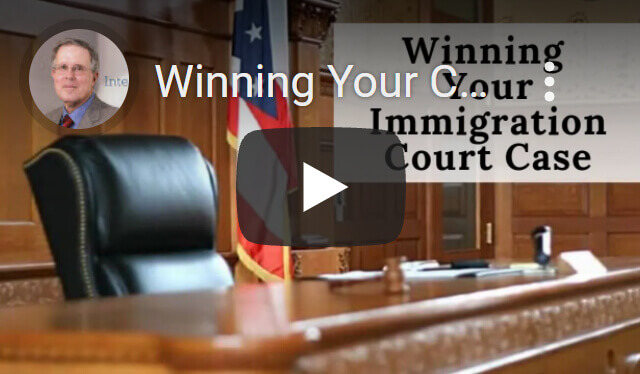Law Protects Surviving Family Members in the US
In 2009, a law was enacted which protects surviving family members when the petitioner or the principal beneficiary of an I-130 visa petition dies.
Previously, the law provided that when the petitioner or the principal beneficiary died, so did the petition. There were few options for surviving relatives:
For example, there is a section of the law which provides that a surviving spouse of a US citizen can self-petition for permanent residence, but only if the marriage occurred at least two years before the petitioner’s death.
Client Reviews

Outstanding Services!
“I want to acknowledge the Law office of Carl Shusterman for their diligent and responsive attention to my case - from H1B to PERM to green card.”
- Ken Calvert, San Antonio, Texas
Read More Reviews
Zoom Consultations Available!
There is also a regulation which provides that where the petitioner of a family-based petition dies before the beneficiaries of the petition became permanent residents, the beneficiaries may request that the USCIS reinstate the petition for “humanitarian” reasons.
Related Page: Basic Eligibility for Section 204(l) Relief for Surviving Relatives (USCIS)
WHO BENEFITS FROM THE SURVIVORS LAW?
Not only does the law eliminate the infamous “widow penalty”, it does so much more!
When either the petitioner or the principal beneficiary dies, in a wide variety of instances, the law acts to protect the surviving family members:
- Parents, spouses and children of a US citizen with pending or approved petitions;
- Beneficiaries, principal or derivative, of pending or approved family-based petitions;
- Beneficiaries, principals or derivative, of pending or approved employment-based petitions;
- Beneficiaries, principal or derivative, of pending or approved asylee/refugee relative petitions;
- Nonimmigrants entitled to “T” (trafficking victims) or “U” (crime victims) status.
Since the waiting times for family-based and employment-based preference can range up to between 5 and 23 years, often petitioners and principal beneficiaries die before the beneficiaries of the petition can obtain permanent residence.
In explaining how the survivors law operates, let’s use the following examples:
Example 1: Family-Based Petition
Ms. Santos’ sister, a citizen of the US, petitioned for her over 20 years ago. At that time, her children were four, two and one year of age. Ms. Santos and her husband work as technicians in the U.S. By the time her priority date became current, her children were 24, 22 and 21.
The USCIS took two years to approve the visa petition. Since the length of time that the visa petition was pending can be subtracted from the age of her children under the Child Status Protection Act, the “immigration ages” of her children are 22, 20 and 19. Therefore, the youngest two are still considered to be children for purposes of adjustment of status, and the older child must wait for a final resolution of the proper interpretation of CSPA’s “automatic conversion” clause.
Ms. Santos, her husband, and her two youngest children all apply for adjustment of status under section 245(i). However, shortly before their interview takes place, her US citizen sister dies.
Under the survivors law, she and her family (except possibly her oldest child) are protected as “survivors” and would be allowed to continue with their applications for adjustment of status despite the death of her sister.
Assuming that Ms. Santos and her family members are all eligible for adjustment of status, the only way their applications can be denied is if the USCIS denies the visa petition by determining that its approval “is not in the public interest”.
Also, since Ms. Santos’ sister has died, another sponsor for an affidavit of support is needed.
Example 2: Same Scenario as Above, but Ms. Santos and her Family are Abroad
If Ms. Santos and her family are abroad on the day that her sister dies, the petition will be revoked by the USCIS. The family’s only recourse is to request a reinstatement of the visa petition on “humanitarian” grounds.
Example 3: Same Scenario as Above, but Ms. Santos, not her Sister, Dies
If Ms. Santos dies before she and her family are able to adjust status, the new law provides that the petition remains approved unless the USCIS determines that this “is not in the public interest”. Her husband and the youngest two children can adjust their status to permanent residents.
This represents a clear departure from previous laws which would have resulted in the denial of adjustment of status applications for her husband and children, and placing them under removal proceedings.
Is there any remedy for the family under this scenario if Ms. Santos’ family had remained abroad? Unfortunately, the answer to this question is “no”.
Example 4: Employment-Based Petition
Dr. Kumar is a physician born in India. His wife and daughter reside with him in the U.S. He is in H-1B status. His wife and daughter are in H-4 status. Dr. Kumar completed his medical residency in the U.S. on a J-1 visa. Then, for three years, he worked in a medically-underserved area in H-1B status.
In 2006, his employer submitted a PERM application on his behalf. It was approved in the Spring of 2007. In July 2007, when all the employment-based numbers became current, Dr. Kumar’s employer submitted an EB-2 visa petition on his behalf. Simultaneously, Dr. Kumar, his wife, and their daughter all applied for adjustment of status. Then his priority date retrogressed.
In 2009, Dr. Kumar was killed by a drunk driver. Under the survivors law, Dr. Kumar’s wife and daughter are permitted to continue with their applications to adjust status. The visa petition could only be revoked if the USCIS determined that its continued approval would not be “in the public interest”.
ELIMINATION OF THE “WIDOW PENALTY”
What follows is some advice for surviving spouses and children under the portion of the new law which relates to widows of US citizens and their children:
How Can I Benefit from the Survivors Law?
Under the law, all surviving spouses can apply for themselves and their children for green cards. The law eliminates the two-year marriage requirement for self-petitions.
If you are physically present in the US, file an I-360 self-petition together with an I-485 application for adjustment of status.
If you reside abroad, file an I-360 self-petition and follow the normal immigrant visa procedures.
In either case, it is incumbent upon you to submit the I-360 within two years of the law’s passage, and to demonstrate that the marriage was bona fide. Include wedding photos, proof of joint assets, etc.
If your spouse dies more than two years after the law’s enactment, your I-360 must be submitted within two years of your spouse’s death.
There is no affidavit of support required. However, you must demonstrate to the government that you are not likely to become a public charge.
Also, if you remarry, you lose your eligibility.
How Can My Children Benefit from the Survivors Law?
Your unmarried children may be included in your I-360 self-petition.
Remember that although the law defines “children” as unmarried and under 21 years of age, the Child Status Protection Act (CSPA) may allow your child’s age to be “frozen”. As a general rule, if the I-130 or I-360 petition was submitted prior to your child’s 21st birthday, they will continue to be considered a child no matter how old they are when the USCIS decides their application for a green card as long as they remain single.
For more information about CSPA, see our Child Status Protection Act FAQ.







